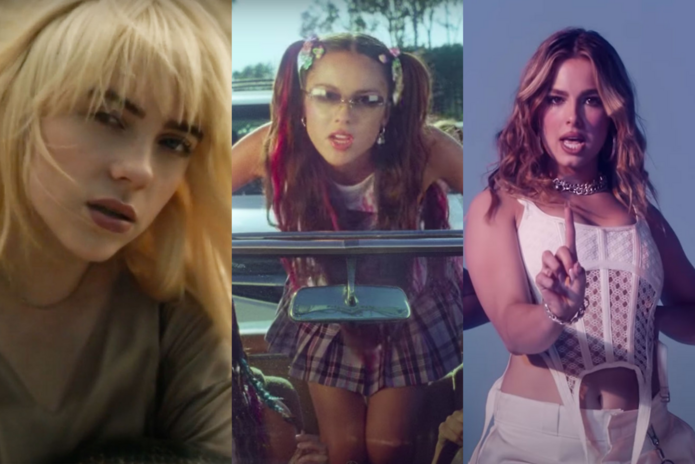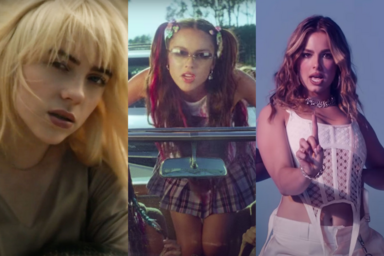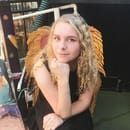I grew up in the early 2000s, and like everyone else, I idolized all the pop-singing, cheetah-print-sporting stars: Miley Cyrus, Hilary Duff, and Victoria Justice — the list of Disney and Nickelodeon royalty goes on and on. To my 8-year-old self, these celebs radiated maturity and represented a thrilling “grown-up” life of adventure, romance and dreams fully realized. I didn’t once stop to think that celebrities younger than me would soon be the ones taking over Hollywood.
In reality, none of these pop stars were as “adult” as I imagined. Hilary released her iconic single “Wake Up” when she was just 18. Meanwhile, Hannah Montana hit peak popularity in 2008, when Miley was only16. These girls were practically babies, but in my mind, they were mature beyond their years.
They had the beauty, confidence and absurdly lax parents (seriously, what’s with that trope in kids’ shows?) that I knew I’d have to wait so long to experience. One day, I told myself, I’d be their age and everything would work out for me. Just like Hilary, I’d “put my makeup on a Saturday night” and hang out with DJs in New York and Hollywood (as you do).
Now, let’s fast forward a few years. I’m 21, hanging around my college campus, listening to 18-year-old Olivia Rodrigo sing about getting her driver’s license, and oh my God, I’m three years older than her and sitting on this stupid bench with an overpriced coffee in my hand and perpetual pain in my back.
Teen pop stars are no longer my “adult” role models; they’re the cool high schoolers that I find myself speed-walking past at the mall.
In other words, I’ve come to the devastating realization that I’m a grown up. Teen pop stars are no longer my “adult” role models; they’re the cool high schoolers that I find myself speed-walking past at the mall. More than that, they’re living, breathing markers of time… time that I’m scared may be passing me by.
On the one hand, I admire these stars for building themselves huge platforms so early in life and inspiring a whole generation of girls along the way. In “good 4 u,” Olivia Rodrigo shows girls that all their angst, rage and frustrations are valid, whereas Billie Eilish, who’s still just 19, has become a leading voice for body positivity. They’re accomplishing truly great things, which is why I feel so damn guilty that their success makes me feel like crap. I should be cheering them on, not cursing them from my couch!
My anxiety manifests in one major question: What have I accomplished in comparison to the Billies and Olivias of the world? I’ve been on this planet years longer and still haven’t done anywhere near as much. I’m not deluding myself into thinking I’ll ever achieve Charli D’Amelio-level fame (nor do I want it). However, looking at the flashy life she leads at only 17(!) makes me feel like I’m not moving fast enough toward the things I do want.
My anxiety manifests in one major question: What have I accomplished in comparison to the Billies and Olivias of the world?
Unsurprisingly, my pessimistic brain wiring has turned all this into a unique form of existential crisis. Nothing has made me more aware of the passage of time than seeing myself age beyond a specific type of famous person, i.e. the young female “voice of a generation.” It feels like just yesterday that all these badass chicks in pop culture were way older than me, and now I’m on the other end of the spectrum. AKA: Holy sh*t, time passes so quickly! Life is so fleeting!
Turns out, there’s some science behind my panic. According to Adrian Bejan, Ph.D., the rate at which we process visual information slows down over time, which makes time seem to “speed up” as we get older.
As kids, we’re forming memories so quickly that every day feels like a lifetime; meanwhile, our adult brains are more content discarding the details. My mind has a whole file cabinet of data on ‘00s teen idols, whereas my entire experience of “adulting” is condensed into a single envelope (okay, not quite that drastic, but you get what I mean).
Part of coming to terms with my “fear” of young stars has involved realizing that I still don’t fully “buy” myself as a grown-up.
This info certainly makes me feel less ridiculous for freaking out about famous teenagers, but it doesn’t change the fact that I’m a whole-a*s adult now. Part of coming to terms with my “fear” of young stars has involved realizing that I still don’t fully “buy” myself as a grown-up. Like, what do you mean I could take out a mortgage if I wanted to?
I don’t feel worthy of or ready for the responsibilities of adulthood, and seeing these teens with monumental, “adult” achievements makes me feel like I’m doing things all wrong. It’s part of the larger black hole of self-comparison that I find myself constantly falling into. Turns out, this is backed by — you guessed it — more science.
Psychologists theorize that women often exhibit indirect aggression toward each other due to our evolutionary history and our internalization of patriarchal norms. Noam Shpancer, Ph.D. writes in Psychology Today that “As women come to consider being prized by men their ultimate source of strength, worth, achievement and identity, they are compelled to battle other women for the prize.”
I’m trying to remember that I’ve still got plenty of time to figure things out. Being older than Addison Rae does not mean I’m DOA.
Even if you aren’t attracted to dudes or think you’re above all the fuss, there’s a fixed, biological basis to this competitive drive. Back in the old days, it was a girl-eat-girl world: making sure you were the one procreating with the next eligible caveman could be the difference between living and dying. Tragically, society and evolution have shaped women into hyper-self-aware warriors, and I, for one, dread the prospect of getting into the ring with any world-famous pop singer.
Don’t get me wrong: I’m totally here for the domination of bada*s young women. Always. My anxiety surrounding their epic power has just shown me that I have my own stuff to work through when it comes to success, self-comparison, and adulthood.
More importantly, I’m trying to remember that I’ve still got plenty of time to figure things out. Being older than Addison Rae does not mean I’m DOA. It just means I’m finding success at my own pace and on my own terms. In the enduring words of Hannah Montana, I’ve gotta “chill it out, take it slow, Then [I’ll] rock out the show.”


